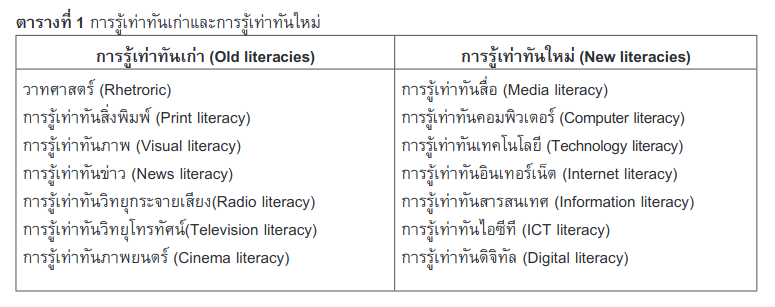Digital Literacy: Evolution, Definition, and Skills Synthesis
Main Article Content
Abstract
The digital literacy is the ability of using both digital hardware and software to study, work, entertain, communicate and participate in creating as well as producing digital content. Thus, users should have analysis skills and digital content evaluation skills. Moreover, users should have responsibility and social ethics under the digital ecosystem. Therefore, to clearly understand the fundamental, the objective of article is to explain the evolution of the digital literacy, the meaning of the digital literacy and the synthesis of the digital literacy skills.
The results could be concluded that the digital literacy skills were comprised of 7 skills, as the following, (1) Accessing skill; the capacity to select and use the digital information technology appropriately. (2) Analysis skill; the capacity of reading and comprehending the content as well as the signals accurately. (3) Evaluation skills; the capacity of judging the quality and the benefit of the content from various sources. (4) Creative skills; the capacity to effectively create the content with the digital technology tools. (5) Communication skills; the capacity to appropriately select the channels to communicate the digital content to the target, under the digital environment. (6) Reflection skills; the capacity to express the opinion, the interaction and the content connection to others, and (7) Action-taking skills; the individual capacity to work and participate with others in sharing knowledge and properly solving problems that are benefit to the overall society.
Article Details

This work is licensed under a Creative Commons Attribution-NonCommercial-NoDerivatives 4.0 International License.
All authors need to complete copyright transfer to Journal of Applied Informatics and Technology prior to publication. For more details click this link: https://ph01.tci-thaijo.org/index.php/jait/copyrightlicense
References
Anyangwe, E. (2012). 20 Ways of thinking about digital literacy in higher education [On-line]. Available: https://www.theguardian.com/higher-education-network/blog/2012
Belshaw, D. (2011). What is digital literacy? a pragmatic investigation. Ed.D. Dissertation, of Department of Education at Durham University.
British Film Institute. (2000). British film institute annual review 1 April 1999-31 March 2000 [On-line]. Available: https://www.bfi.org.uk/sites/bfi.org.uk/files/downloads/bfi-annual-review-1999-2000.pdf
Buckingham, D. (2006). Defining digital literacy : What do young people need to know about digital media?. Digital Kompetanse. 1: 263-276.
California Emerging Technology Fund. (2008). California ICT digital literacy policy framework. [On-line]. Available:https://ictliteracy.info/rf.pdf/california%20%20ICTPolicy%20Framework.pdf
Calvani, A., Fini, A. and Ranieri, M. (2009). Assessing digital competence in secondary education. Issues, models and instruments. In M. Leaning (ed.). Issues in information and media literacy: Education, practice and pedagogy. Informing Science Press (pp.153-172). California: Informing Science Press Publishing.
Covello, V. T. (2010). Strategies for overcoming challenges to effective risk communication. In R. J. Heath and H. D. O’Hir (ed.). Handbook of risk and crisis communication (pp. 143-167). New York: Routledge.
Fantin, M. and Grardello, G. (2008). Digital literacy and cultural mediations to the digital divide. In P.C. Rivoltella (ed.). Digital literacy: tools and methodologies for information society (pp.310-340). New York: IGI Publishing.
Hartley, S. (2011). Communication, cultural and media studies: the key concepts. 4th ed. Oxford: Routledge.
Hobbs, R. (2010). Digital and media literacy: a plan of action. Washington: The Aspen Institute Communications and Society Program.
Hobbs, R. and Moore, D. C. (2013). Discovering media literacy: teaching digital media and popular culture in elementary school. California: SAGE Publications.
Horton, F. W. (2007). Understanding information literacy: a prim. Paris: The United Nations Educational Scientific and Cultural Organization.
Jirasopol, P. (2017). Communication literacy in digital age and its role in guiding the direction of communication reform in Thai society.(In Thai). Bangkok : Communication Arts Faculty Dhurakij Pundit University.
Jutrakol, S. (2017). Digital literacy, digital natives and family. (In Thai). Journal of Management Science Chiangrai Rajabhat University. 11(1): 131-150.
Krutasean, U. (2013). The development of the media literacy learning process approach for the youth leader. (In Thai). Bangkok : Doctoral of Management Degree in Business Suan Dusit Rajabhat University.
Lankshear, C. and Knobel, M. (2006). New literacy: everyday practices and classroom learning. 2nd ed. Maidenhead: Open University Press.
Media Awareness Network. (2010). Digital and literacy [On-line]. Available: https://mediasmarts.ca/sites/mediasmarts/files/pdfs/publication-report/full/digitalliteracypaper.pdf
National Statistical Office. (2016). The use of information and communication technology in the household in 2016 [On-line]. (In Thai). Available:https://service.nso.go.th/nso/nsopublish/themes/files/icthh_exc_59.pdf
Punie, Y. and Redecker, C. (2012). Understanding digital competence in the 21st century: An analysis of current frameworks. Lecture Notes in Computer Science. 7563: 79-92.
Summey, D. C. (2013). Developing digital literacies a framework for professional learning. California: SAGE Publications.
United Nations Educational Scientific and Cultural Organization (UNESCO). (2011). Digital literacy in education [On-line]. Available: https://unesdoc.unesco.org/images/0021/002144/ 214485e.pdf
White, J. (2015). Digital literacy skills for FE teachers. London: SAGE Publications.






